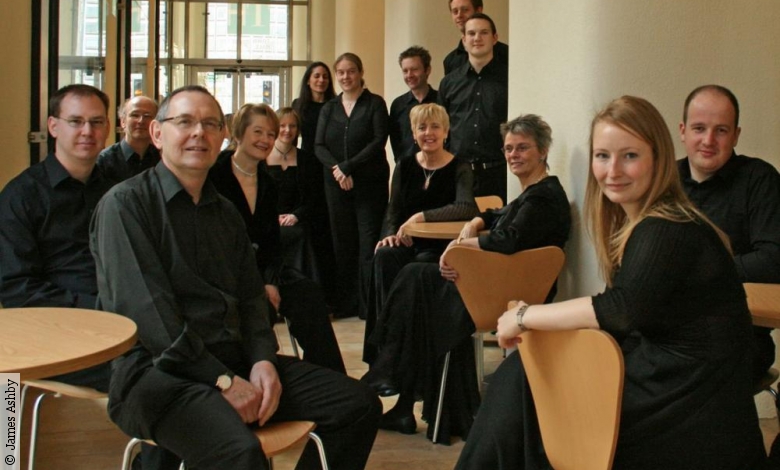St Matthew Passion, Ex Cathedra, Skidmore, Symphony Hall Birmingham - powerful, poignant Bach | reviews, news & interviews
St Matthew Passion, Ex Cathedra, Skidmore, Symphony Hall Birmingham - powerful, poignant Bach
St Matthew Passion, Ex Cathedra, Skidmore, Symphony Hall Birmingham - powerful, poignant Bach
Simple and nuanced performance of a supreme masterpiece

For the final instalment of their three Matthew Passions this Holy Week, Ex Cathedra gave a large scale performance of Bach’s oratorio in their home town on Birmingham, after dates with lesser forces in London and Bristol.
Ex Cathedra’s Artistic Director and Conductor Jeffrey Skidmore (pictured below with the group by James Ashby) was careful to be faithful to elements of Bach’s writing: using two choruses, two orchestras, and having the major soloists also singing within the choirs. However, like all great works of art, Bach’s St Matthew Passion is not merely a slice of history to be looked at through the lens of the past, but something which lives and breathes, as relevant to us to day as it was to those in Bach’s time, and Skidmore’s interpretation was conceived with a 21st century audience in mind. The performance opened with the chorale prelude and chorale "Sei gegrüsset, Jesu gütig", written by contemporary composer Alec Roth as part of the Orgelbüchlein Project, a global composition project to fill the 118 gaps where the music has been lost in Bach’s Orgelbüchlein (Little Organ Book) with new work. This sombre and contemplative piece was a fitting opening to the afternoon.  Jeremy Budd was an excellent evangelist as he drove the narrative. Singing from his spot in the choir (given the role, it would have been wholly for him to come to front each time he sang a solo, as the other soloists did) his voice carried through with sparkling clarity. Marcus Farnsworth as Jesus sang with a robust strength, and Greg Skidmore’s Judas had a dark sonority deeply suited to the character. The alto aria "Erbame dich" was sung superbly by Martha McLorinen, who beautifully conveyed the deep sorrow of the text, and the solo violin passage which opens the aria was given a gorgeous fluidity from Orchestra 1 leader Lucy Russell.
Jeremy Budd was an excellent evangelist as he drove the narrative. Singing from his spot in the choir (given the role, it would have been wholly for him to come to front each time he sang a solo, as the other soloists did) his voice carried through with sparkling clarity. Marcus Farnsworth as Jesus sang with a robust strength, and Greg Skidmore’s Judas had a dark sonority deeply suited to the character. The alto aria "Erbame dich" was sung superbly by Martha McLorinen, who beautifully conveyed the deep sorrow of the text, and the solo violin passage which opens the aria was given a gorgeous fluidity from Orchestra 1 leader Lucy Russell.
Both orchestras - led respectively by Russell and Alison Bury - made a sumptuous sound, period instruments lending a rich warm, timbre. Skidmore’s conducting, as with the performance as a whole, wasn’t showy - but that doesn’t mean there wasn’t a lot going on. A closer look revealed each nuance of the music expertly teased out, and every musician on stage was right on the tip of his fingers. This was a powerful performance, which let the beauty of Bach’s music and the anguish of Christ’s passion be both heard and felt. To finish, Skidmore was conducting not just those on stage but in the audience too, as the performance finished with audience and performers singing Bach’s arrangement of Johan Crüger’s "Now thank we all our God". Having everyone join together in song is another nod to what would been the norm for performances in Bach’s lifetime. Bringing the audience to their feet to sing at the end of a performance is also a great way to ensure a standing ovation from most of the hall. It was not wholly undeserved though, as this was indeed a splendid performance of a monumental work.
rating
Explore topics
Share this article
The future of Arts Journalism
You can stop theartsdesk.com closing!
We urgently need financing to survive. Our fundraising drive has thus far raised £49,000 but we need to reach £100,000 or we will be forced to close. Please contribute here: https://gofund.me/c3f6033d
And if you can forward this information to anyone who might assist, we’d be grateful.

Subscribe to theartsdesk.com
Thank you for continuing to read our work on theartsdesk.com. For unlimited access to every article in its entirety, including our archive of more than 15,000 pieces, we're asking for £5 per month or £40 per year. We feel it's a very good deal, and hope you do too.
To take a subscription now simply click here.
And if you're looking for that extra gift for a friend or family member, why not treat them to a theartsdesk.com gift subscription?
more Classical music
 Shibe, LSO, Adès, Barbican review - gaudy and glorious new music alongside serene Sibelius
Adès’s passion makes persuasive case for the music he loves, both new and old
Shibe, LSO, Adès, Barbican review - gaudy and glorious new music alongside serene Sibelius
Adès’s passion makes persuasive case for the music he loves, both new and old
 Anja Mittermüller, Richard Fu, Wigmore Hall review - a glorious hall debut
The Austrian mezzo shines - at the age of 22
Anja Mittermüller, Richard Fu, Wigmore Hall review - a glorious hall debut
The Austrian mezzo shines - at the age of 22
 First Person: clarinettist Oliver Pashley on the new horizons of The Hermes Experiment's latest album
Compositions by members of this unusual quartet feature for the first time
First Person: clarinettist Oliver Pashley on the new horizons of The Hermes Experiment's latest album
Compositions by members of this unusual quartet feature for the first time
 Gesualdo Passione, Les Arts Florissants, Amala Dior Company, Barbican review - inspired collaboration excavates the music's humanity
At times it was like watching an anarchic religious procession
Gesualdo Passione, Les Arts Florissants, Amala Dior Company, Barbican review - inspired collaboration excavates the music's humanity
At times it was like watching an anarchic religious procession
 Classical CDs: Camels, concrete and cabaret
An influential American composer's 90th birthday box, plus British piano concertos and a father-and-son duo
Classical CDs: Camels, concrete and cabaret
An influential American composer's 90th birthday box, plus British piano concertos and a father-and-son duo
 Cockerham, Manchester Camerata, Sheen, Martin Harris Centre, Manchester review - re-enacting the dawn of modernism
Two UK premieres added to three miniatures from a seminal event of January 1914
Cockerham, Manchester Camerata, Sheen, Martin Harris Centre, Manchester review - re-enacting the dawn of modernism
Two UK premieres added to three miniatures from a seminal event of January 1914
 Kempf, Brno Philharmonic, Davies, Bridgewater Hall, Manchester review - European tradition meets American jazz
Bouncing Czechs enjoy their Gershwin and Brubeck alongside Janáček and Dvořák
Kempf, Brno Philharmonic, Davies, Bridgewater Hall, Manchester review - European tradition meets American jazz
Bouncing Czechs enjoy their Gershwin and Brubeck alongside Janáček and Dvořák
 Solomon, OAE, Butt, QEH review - daft Biblical whitewashing with great choruses
Even a top soprano and mezzo can’t make this Handel paean wholly convincing
Solomon, OAE, Butt, QEH review - daft Biblical whitewashing with great choruses
Even a top soprano and mezzo can’t make this Handel paean wholly convincing
 Two-Piano Gala, Kings Place review - shining constellations
London Piano Festival curators and illustrious friends entertain and enlighten
Two-Piano Gala, Kings Place review - shining constellations
London Piano Festival curators and illustrious friends entertain and enlighten
 Echo Vocal Ensemble, Latto, Union Chapel review - eclectic choral programme garlanded with dance
Beautiful singing at the heart of an imaginative and stylistically varied concert
Echo Vocal Ensemble, Latto, Union Chapel review - eclectic choral programme garlanded with dance
Beautiful singing at the heart of an imaginative and stylistically varied concert
 Scott, Irish Baroque Orchestra, Whelan, RIAM, Dublin review - towards a Mozart masterpiece
Characteristic joy and enlightenment from this team, but a valveless horn brings problems
Scott, Irish Baroque Orchestra, Whelan, RIAM, Dublin review - towards a Mozart masterpiece
Characteristic joy and enlightenment from this team, but a valveless horn brings problems

Add comment